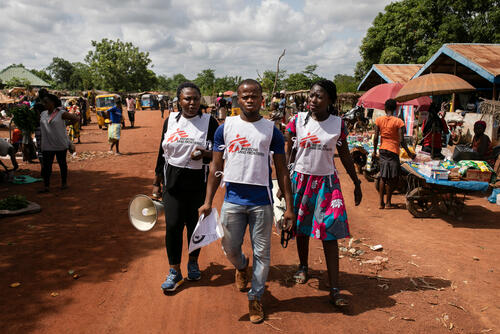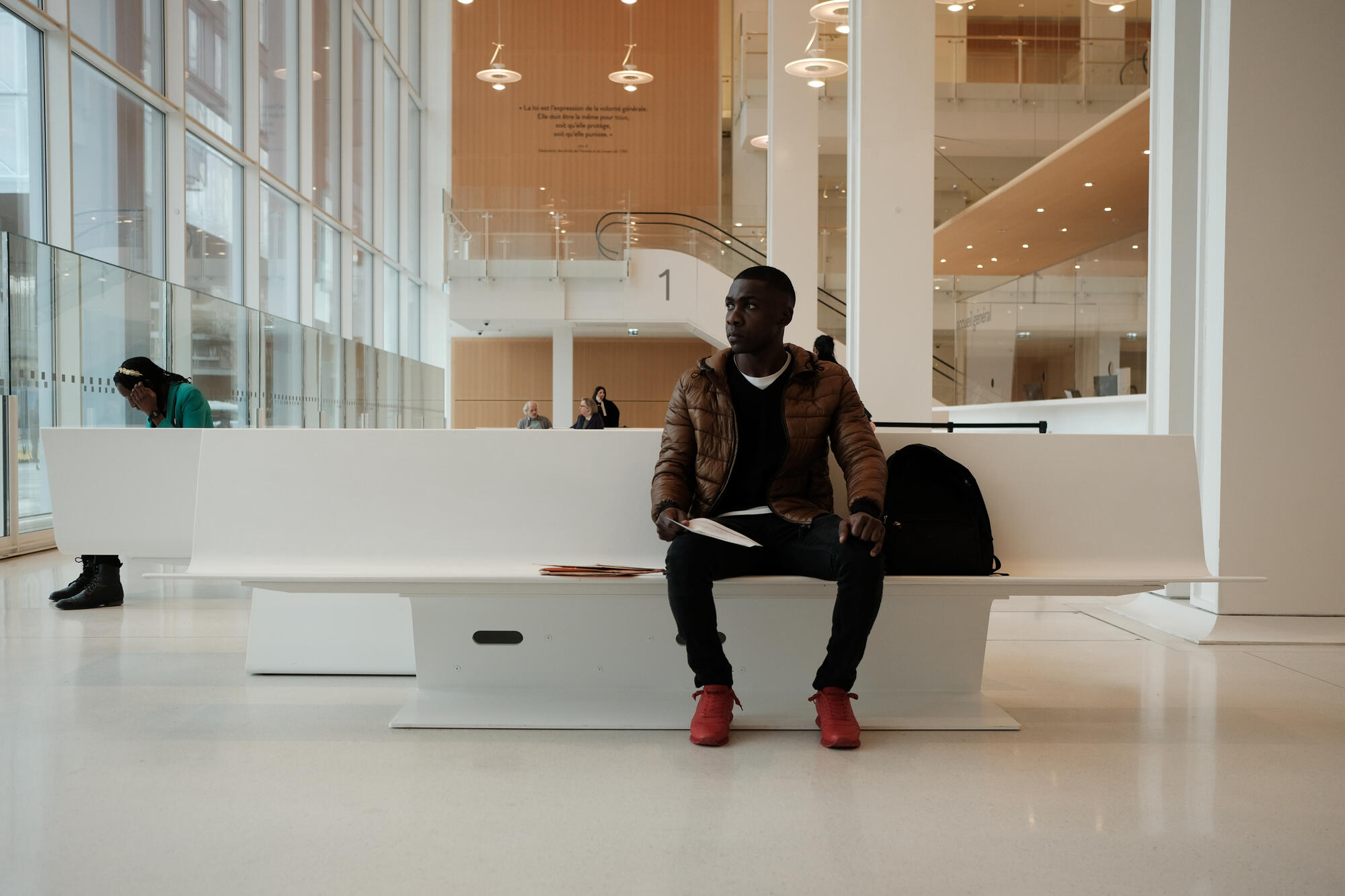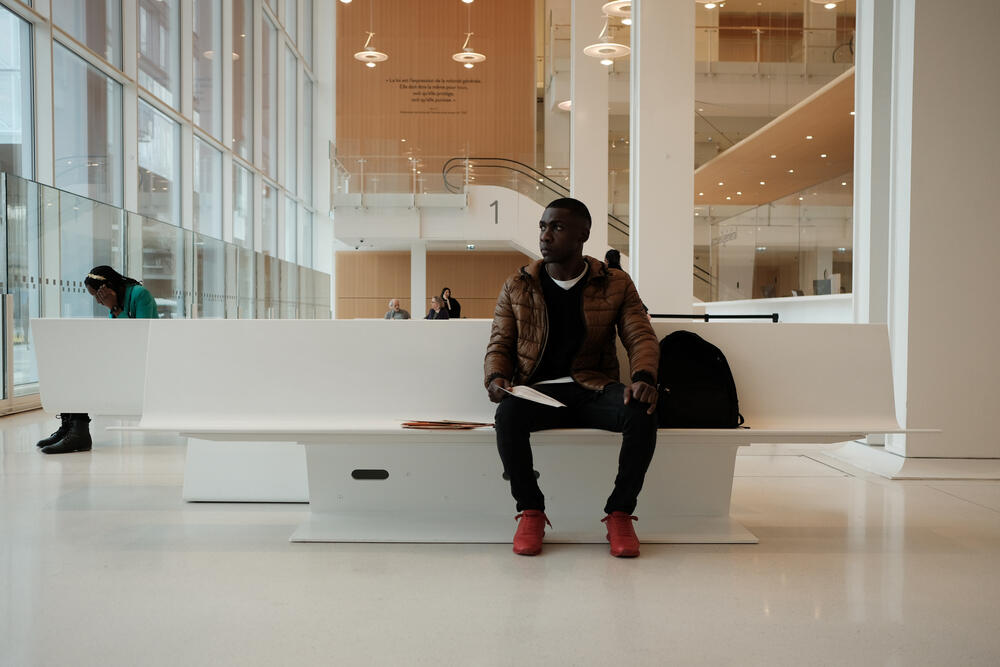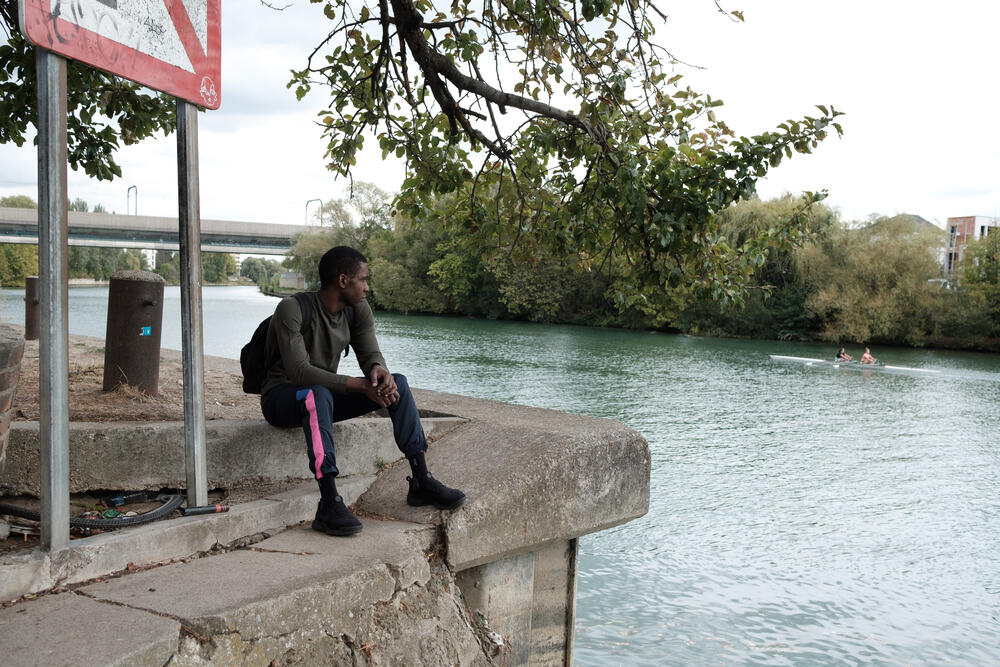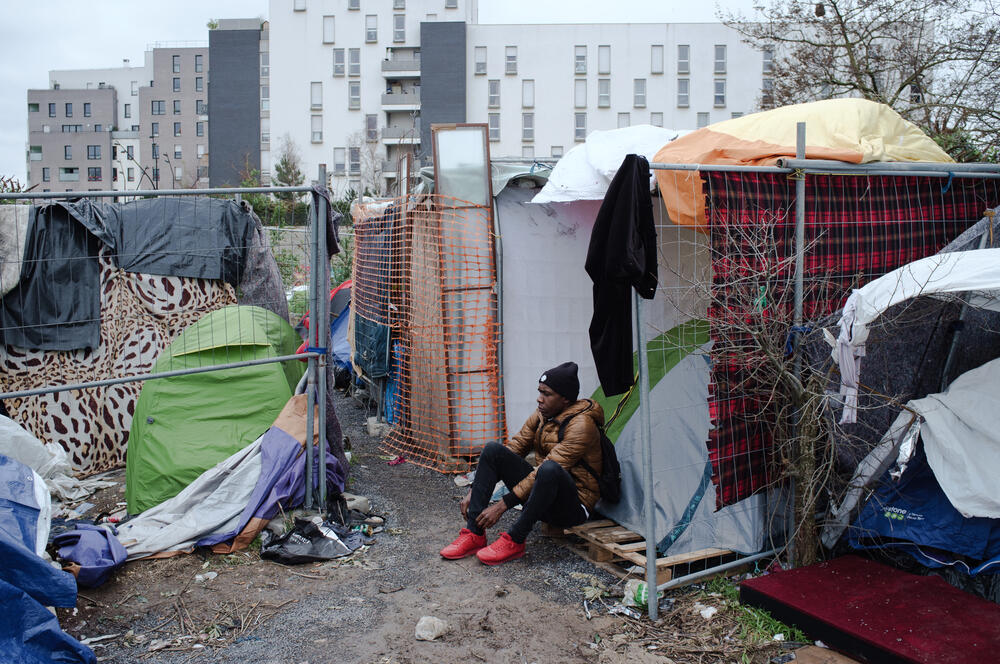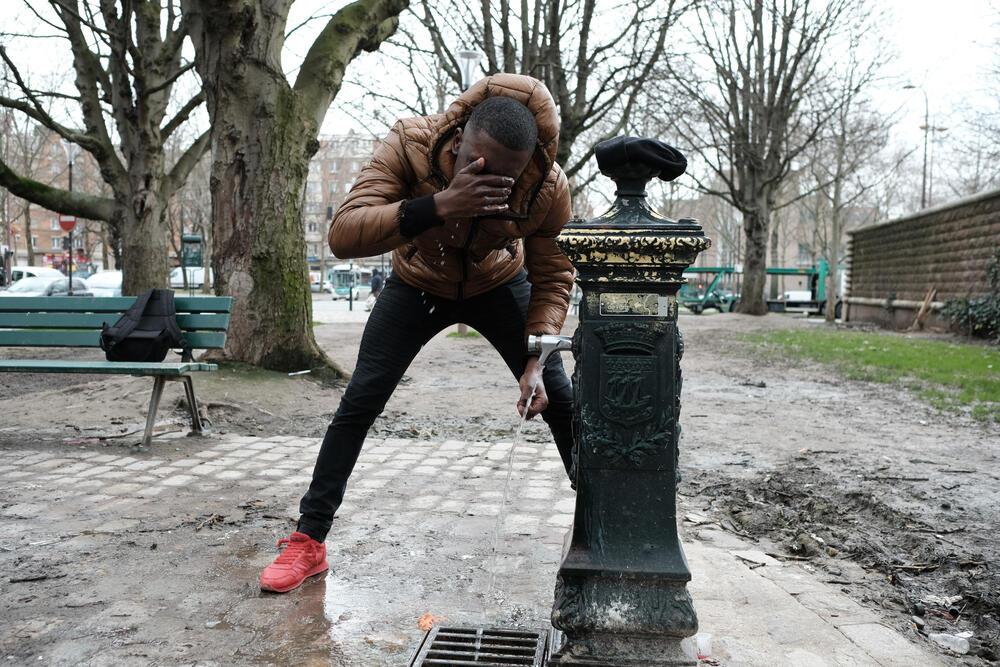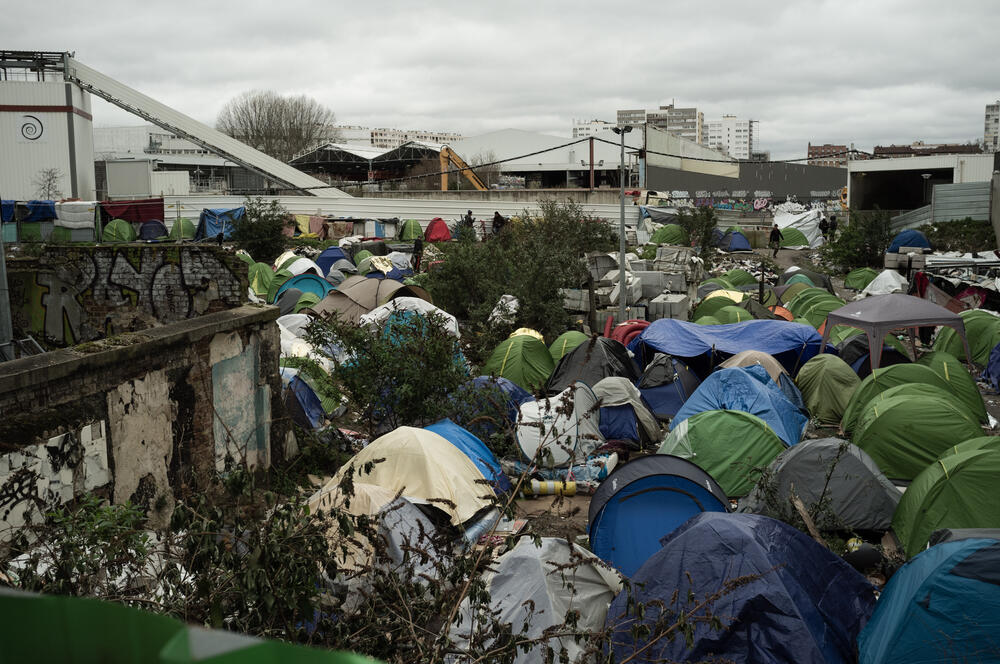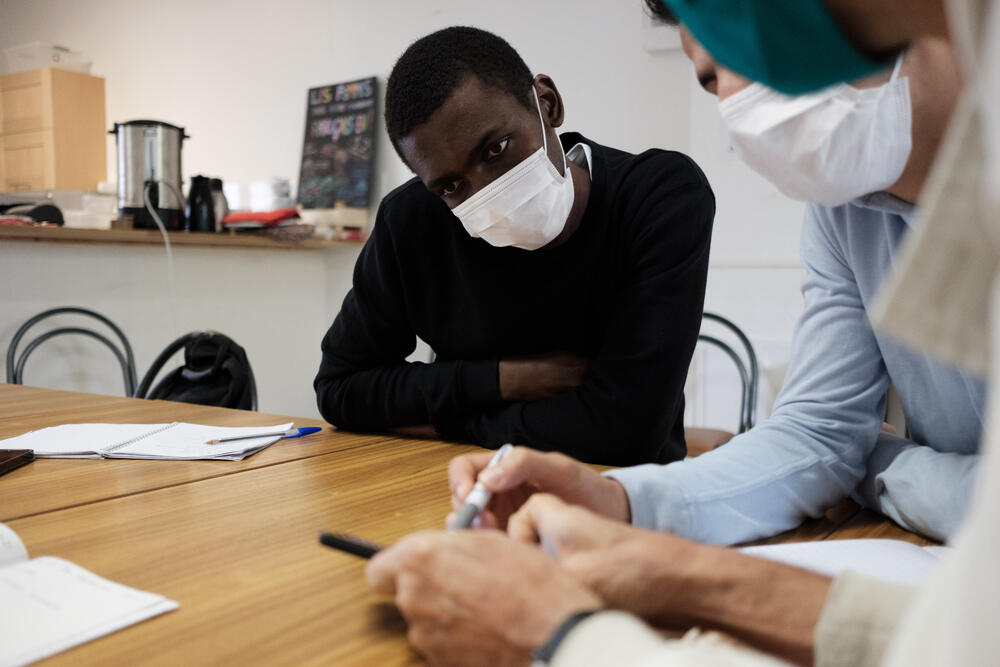After a childhood of frequent homelessness in Cameroon, Yannick was kidnapped by people traffickers in 2019 and sold as a slave in Libya.
He escaped and undertook a traumatic journey to Europe, where he found refuge in France and now receives support from Médecins Sans Frontières / Doctors Without Borders (MSF).
Now recognised as an unaccompanied minor, he tells us his story.
“I come from Baloum, in the Menoua region of western Cameroon. My village is in the countryside, with trees and huts; it’s always cool there because it is surrounded by mountains.
I lived in my mother's neighbourhood. My father died when I was two years old but I didn't find that out until I was seven. My mother remarried and her husband physically abused me. From time to time I’d leave home and sleep on the streets. My grandmother would come and find me.
On the streets, I was with young people like me: thrown out of their homes, treated badly or choosing to leave. When I left home for the first time, I was 11 years old. I spent a few months outdoors, then I came back. But nothing changed so I decided to leave for good.
With my friends on the streets, I felt fine, I felt free. Everything I’d been through at home – all the violence – was in the past when I was on the streets. We slept in sheds, under market counters, in booths. To eat, we begged in the market: ‘Madame, excuse me, we are hungry, we don't have enough to survive.’
Some people let us give them a hand in exchange for a little money. Market traders asked us to unload the goods or to guard their stall at night. During the day, we walked a lot, we went here and there, we had fun."
"Between the ages of 11 and 13, I alternated between the streets, my mother's house and my grandmother's house. After that, it was just the streets.
Some people from my village tried to help. I became attached to a man who considered me a little like his son. He was concerned about how I was doing and encouraged me to go to church. As the church was next to a college, every now and again we’d attend a class.
Some people tried to offer advice on how to protect ourselves on the streets. But we had to avoid getting too attached to people. Living on the streets, many of my friends disappeared. We were vulnerable and some people took advantage of that.
How did I end up outside Cameroon? This man I’d become attached to would sometimes take me to his house for the weekend. He became like a relative to me. He had a shop in the market where he sold all kinds of things. He often offered me food.
One day he said to me: ‘You're living on the streets, but I think you're a bit different from your friends, so I'm going to try to get you out of this situation.’
I had never been out of Cameroon. I knew nothing except Douala, Yaoundé and the west of the country. He suggested that I go to Chad. I had heard about it at school. He told me there was a family there with whom I could live a normal life. So I accepted.
We left in March or April 2019. I was happy to go to Chad, even though I didn't really know where we were going. We took the train and then the bus. When we arrived, the people were totally different so I could see that it was no longer my country. The landscape was different too. Everything had changed.
He took me to a Cameroonian house. He told me that it was his family and that I would live there, live a normal life. I said yes.”
Unaccompanied minors
In 2020, 9,524 young people were recognised as 'unaccompanied minors' by France and referred to Aide Sociale à l'Enfance (Youth Social Welfare) for protection. According to the Ministry of Justice, just over 94 percent were boys, mostly aged between 15 and 17 years old. The most common countries represented were Guinea, Côte d'Ivoire and Mali.
However, these figures only include young people who have been recognised as minors after an initial assessment by authorities. The statistics do not include the fact that more than half of those who are not recognised at first go on to successfully appeal the decision. It is these unaccompanied minors without 'official' recognition who MSF aims to help.
“One night, we left on a journey. It was night time. At some point, I no longer knew where we were. I was starting to be afraid. They told me that we were going to spend the night in another house.
The next day, when I woke up, the people were different. I found out later that they were Libyans and that I had been sold as a slave in Libya. I was in a prison. It was a big room with a lot of people in it. It was like a chicken coop with nothing but small holes for light.
Every morning we were taken in trucks to do forced labour. You have to do what you're told or you'll be killed. You become their property. In prison I was tortured a lot."
"One day, we were taken to work in Tripoli. This was our chance to escape, and we took it, but some of the young people were killed by the Libyans. We fled without knowing where we were going. We walked until the next day.
In the group there was a boy I got on well with. He became my companion. We survived by begging. One day he told me he knew how to get us out. He told me we had to go to a certain town. When we arrived there, one evening we managed to insert ourselves into a group of people the Libyans had put in a ‘Zodiac’ [an inflatable boat] to come to Europe, to Italy.
I don't know how I got to Sicily in Italy as I lost consciousness on the way. I woke up in the boat that rescues migrants at sea.”
The deadly central Mediterranean crossing
Libya is a historic crossing point for migration routes to Europe. However, in recent years, migrants and refugees here have faced unprecedented levels of violence, exploitation, torture, and imprisonment in inhumane conditions without access to medical care.
To escape, many people attempt to cross the central Mediterranean Sea to reach Europe, risking their lives along the way. In 2021, an estimated 1,508 people died or went missing while attempting the crossing. And, since 2014, 23,108 people have died or gone missing on this same route.
“In Sicily, I saw the Red Cross logo for the first time. When we got off the boat, they put us in buses to take us to large rooms. We were given new clothes. We were able to wash, dress, have a meal and sleep in a bed. They ask you to write your name, age and country on a piece of paper. I stayed there for a week.
After a week, they put me in a group with the other minors. They said they had to send us to a city called Rome. We were locked up, we couldn’t go out. We ate, we washed, we slept. Nothing else. And it was like that every day. We didn't feel good there, so one day I and some other young people decided to leave. To go and live on the streets.
In Italy, I didn't understand the language. I didn't feel comfortable. So we decided to go to France. French-speaking Africans gave us directions: leave Rome, go to Milan, then Ventimiglia, then take the train to France."
"We fare-dodged all the way. On the train, the police arrested us. They sent us back to Italy. We walked all day to get back to Ventimiglia. Other migrants told us that we could go through the mountains to Nice. So we walked. We slid down ravines, we were covered in mud and dirt. When we arrived in Nice, everyone stared at us.
We walked to the main road and hid. It was about five the morning. We waited for the first bus to pass. We wanted to keep moving, to wherever it was. We got to the end of the line and found ourselves in Marseille.
Someone said we should go to Paris, so we took the train. When the conductor came round, we hid. We arrived in Paris around five in the afternoon. We didn't know where to go. It was August or September 2019. The first thing we wanted to do was to see the Eiffel Tower. But we never got there that day. Instead we got lost.”
Arriving in France
Unaccompanied minors arrive in France after long, chaotic and often traumatic journeys. On top of the traumatic situation that originally led them to abandon their life back home, many have also encountered violence on their route.
However, once in France, they face uncertainty and potential destitution, including a precarious legal status, unstable housing and having too little to eat.
“The next morning, we looked for shelter. A man advised us to go to the police. So that's what we did. They started asking us lots of questions. It scared us. They took us to the Red Cross.
The people from the Red Cross asked about my background. I told them everything: the abuse, the torture, and then my life in Italy. I told my whole story. They asked me if I needed a psychologist. ‘What's a psychologist?’ I asked.
I was advised to go to the court in Paris, but I didn't know how. Then I lost the others in my group.
At the hotel where I was staying, we couldn't stay in all day. We were allowed back in at 7 pm, just to eat, shower and sleep. I was waiting for the results of the assessment. I don't know who decides, but they didn't recognise me as a minor. All I got was another paper to go to court.
At the exit of the court, people stopped me. That day was the first time I went to the MSF place in Pantin. When I arrived, a man called Ali called me into his office. He explained that they would continue the process and open a file to appeal to the children’s judge. ‘It will take some time,’ he warned me.
Next we were taken to get tents from Utopia 56 (a French organisation providing help to migrants). And then we went to the hill (the location of a camp for displaced people). When we arrived, we saw a lot of people were sleeping there. We set our tents up in a corner. I went back to MSF for my appointments with the social worker and the psychologist.”
“I stayed in that tent at Porte d'Aubervilliers for about two months. It was very cold. We had no heating. I was afraid I’d fall asleep and the next day I wouldn’t wake up.
On 19 December 2019, I had an appointment with MSF in Pantin and was told they had found a shelter for me. I no longer had to sleep in a tent. I had a place in Passerelle, a hotel run by MSF.
I was going to stay there for three months and then go to a host family. I started further education. We took French classes once a week and were offered activities and training. That's when I started to think about the future.
I’d never done any training before – I thought it would be nice. I’d like to study logistics and then work for humanitarian organisations, to help people who are going through what I went through. I often think about the people I met on my journey and the way they always told me: ‘It's going to be okay, it's going to be okay.’”
MSF’s Pantin and Passerelle projects
In 2017, MSF opened a daytime reception centre in Pantin, northeast Paris, to provide medical, psychological, legal and social support to unaccompanied minors who have not been officially recognised. The centre fills a huge gap left by the French authorities.
The centre has supported more than 2,788 young people, providing 10,345 medical consultations, 6,746 mental health consultations, 1,518 referrals to a children’s judge and 4,868 social consultations. The team also help meet basic needs such as food, clothing and French classes.
In August 2018, MSF also opened Passerelle, a shelter for young people in the Paris area who need emergency accommodation – due to either a significant physical or psychological condition affecting their health. The shelter is managed with support from Utopia 56, and housed 53 people in 2021.
The young people staying at Passerelle also receive help from the Pantin project, as well as support from a dedicated social worker until their situation stabilises and they are able to live with a family taking part in the programme.
“I was recognised as a minor in March 2020, during the first lockdown. I was going to be taken into the care Youth Social Welfare. This also meant that I wouldn’t go to live with a foster family.
I received the placement order from the judge at the end of March. The next day, I was directed to the SEMNA (educational sector for unaccompanied minors). They put me up in a hotel in Pigalle until I could be placed elsewhere. They asked me where I would prefer to live: an apartment with other young people or a hostel.
I’d have preferred to stay with a foster family, but that was no longer possible. So I chose to live in an apartment. My advisor at SEMNA sent my profile to the Red Cross. A few days later, they accepted me. I moved in two days before the end of lockdown."
"When I tell this story, I feel liberated. Because when I'm alone, I think about it a lot, even though I prefer to be alone.
The little moments that make me feel good are when I am alone at home. And when I go to see my psychiatrist. I feel good afterwards. When I go back to Aubervilliers too.
It wasn't an easy life, but I like going there and passing the time. It makes me feel good. And bad too. I see people – not the same people as when I was there. I go there, I sit down. If someone comes, they sit next to me and we start talking. We talk, we try to find out who the other is. We share what we are going through.
It's important to share my story, to explain what I've been through. All I want is to have a normal life, a job. To be able to do something. To have a family one day. To live like everyone else.”
Today, Yannick is enrolled on a course in logistics after completing another course as a house painter. He also volunteers for a French charity, where he helps prepare and distribute meals at a restaurant.
Receive email updates about how you can lend your voice and support
